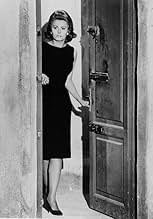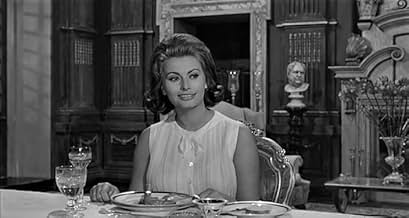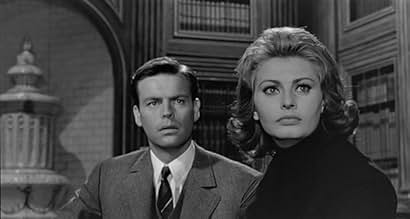CALIFICACIÓN DE IMDb
6.7/10
692
TU CALIFICACIÓN
Agrega una trama en tu idiomaAn insane German war criminal lives in a secluded house owned by his rich father who lets him think the war is still on, some 15 years after the fact.An insane German war criminal lives in a secluded house owned by his rich father who lets him think the war is still on, some 15 years after the fact.An insane German war criminal lives in a secluded house owned by his rich father who lets him think the war is still on, some 15 years after the fact.
- Dirección
- Guionistas
- Elenco
- Premios
- 2 premios ganados y 1 nominación en total
Carlo Antonini
- Police Official
- (sin créditos)
Antonia Cianci
- Maid
- (sin créditos)
Alfredo Franchi
- Groundskeeper
- (sin créditos)
Roberto Massa
- Chauffeur
- (sin créditos)
Osvaldo Peccioli
- Cook
- (sin créditos)
Lucia Pelella
- Groundskeeper's wife
- (sin créditos)
- Dirección
- Guionistas
- Todo el elenco y el equipo
- Producción, taquilla y más en IMDbPro
Opiniones destacadas
It was very long ago, but this film touched me deeply. A became obsessed with Shostakovich's 11th Symphony, and remember vividly some scenes. When Maximillian Schell is finally "released" and goes out into the city (Hamburg?) to see what Germany has become, he is repulsed. When Frederich March is told he will die, he is solemn. The plot, that they have hidden their son because he is a wanted war criminal. That they collaborated willingly with the Nazis, as an industrial power. Perhaps I have forgotten important details. But the movie resonates with me.
I always regarded "The Prisoners of Altona" as Sartre's most interesting and perhaps best play, but I did not know that Vittorio de Sica had made a film on it and with Sophia Loren and other great actors, Cesare Zavattini having even somewhat added to the play. The main interest of the play is that it's a Frenchman's assessment of the post-war German situation with acute observations, conclusions and profound considerations. The main character Franz has never left the war behind, while his father, a great industrialist tycoon, has received his own death sentence by a cancer diagnosis and faces the problem and necessity of allowing his life's work a continuity. He has another son (Sophia Loren's husband, Robert Wagner,) who is willing to accept to take over, but his elder brother looms as the bearer of an ominous destiny of the family. Franz (Maximilian Schell) ultimately refuses to accept that Germany is flourishing again, that it is rising to new power and prosperity and clinches to his experience of a defeated nation all in ruins with its people resorting to underground beggary and scavenging, as if the reality of its ruin was of greater comfort to him than any news of its prosperity. Vittorio de Sica made this film two years after "Two Women", and it's in the same vein - relentless realism brought to overwhelming pathos and tragedy. He alternated his serious films with comedies and loved to act himself in comedies, he was more active as an actor and comedian than as a director, but his serious films remain his masterpieces. There is no sweet and lovely Italian music here but the bleak and depressive wailing disharmonies of Shostakovich instead, which actually provide an appropriate mood and accompaniment to this very morose film. It's not one of his best films, but it certainly belongs to his most interesting.
... from director Vittorio De Sica. German shipping magnate Fredric March learns that he has six months left to live. He summons his son Robert Wagner and daughter-in-law Sophia Loren to his palatial estate in order to set plans for his passing. Loren, who resents Germany's Nazi past and March's role in it, learns that March's older son (Maximilian Schell), believed long dead, has lived in seclusion since the end of the war, so she sets out to learn why he is hidden away. Also with Francoise Prevost and Gabriele Tinti.
This must have been a major European release at the time, as De Sica was one of the most respected directors, and Loren and Schell had just won the lead acting Oscars. It's heavy stuff, with the examination of German culpability for Nazi atrocities a thorny subject. The version I watched was in Italian with subtitles, so it was odd seeing March, Schell and Wagner dubbed with others' voices.
This must have been a major European release at the time, as De Sica was one of the most respected directors, and Loren and Schell had just won the lead acting Oscars. It's heavy stuff, with the examination of German culpability for Nazi atrocities a thorny subject. The version I watched was in Italian with subtitles, so it was odd seeing March, Schell and Wagner dubbed with others' voices.
This is a darkly disturbing film of a Nazi war criminal, still wearing his German army uniform, who is hidden in his father's house, and led to believe that World War II is still going on. The ending of the movie is a bizarre mix of Fellini and Capote. Schell escapes his "prison" and walks around the streets only to be "shocked" that there is no destruction or war raging. He ends up in a local theater and salutes an actor playing Hitler. I won't give the ending away, but it's a shocking surprise ala Play Dirty or To Live and Die in LA. The acting is great, the black and white film make the movie realistic and it captures a time in history which hopefully is gone for ever. An excellent film.
While this film was not entirely successful, there are scenes that will stay in your mind forever! If you liked Von Trier's "Zentropa", you will like this film on a similar theme.
¿Sabías que…?
- TriviaSpencer Tracy was offered but declined the role of Albrecht von Gerlach.
- ErroresNazi uniforms were banned after the war, yet Franz walks through the city without being arrested or beaten up. He gets a few strange looks but is otherwise ignored.
- Versiones alternativasEvery reference to National Socialism was cut from the West German version in 1962.
Selecciones populares
Inicia sesión para calificar y agrega a la lista de videos para obtener recomendaciones personalizadas
- How long is The Condemned of Altona?Con tecnología de Alexa
Detalles
- Fecha de lanzamiento
- Países de origen
- Idiomas
- También se conoce como
- The Condemned of Altona
- Locaciones de filmación
- Productoras
- Ver más créditos de la compañía en IMDbPro
Taquilla
- Total en EE. UU. y Canadá
- USD 2,398,000
- Tiempo de ejecución1 hora 54 minutos
- Color
- Mezcla de sonido
- Relación de aspecto
- 2.35 : 1
Contribuir a esta página
Sugiere una edición o agrega el contenido que falta

























